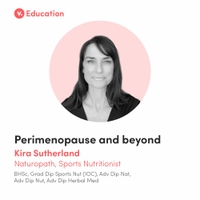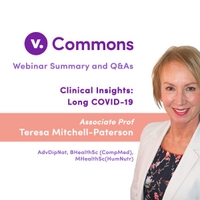The vascular endothelium is a single-cell layer lining which covers the surface of blood vessels. With an estimated surface area, the size of ½ to 1 soccer field, it plays a critical role in health and well-being. Dysfunction of this important system appears to be crucial to the development of multiple types of vascular disease, ranging from ischaemic heart disease to stroke, peripheral vascular disease, and even the complications arising from some severe infectious diseases, such as SARS-CoV-2 (the virus causing COVID-19). The concept of endothelial dysfunction ties together many classic and novel cardiometabolic risk factors and provides a basis for preventing and managing cardiovascular risk.
Webinar overview
- Definition of vascular endothelium
- History of endothelial biomedicine
- Review of endothelial physiology and pathophysiology
- SARS-CoV-2 and its impact on endothelial function
- Testing for endothelial dysfunction
- Management of patients with endothelial dysfunction
- Management of patients with myocardial infarction
- Treatment of endothelial dysfunction, including herbal, nutritional, dietary and lifestyle interventions.
Further discussion on:
- Mediterranean diet
- Plant biophenols (key benefits, clinical studies, dosing and adulteration), including:
- Extra-virgin olive oil (EVOO)
- Olive leaf extract (OLE)
- Garlic
- Blueberries
- Grape seed extract (GSE)
- Other valuable dietary components (lycopene, omega-3 fatty acids).
Key takeaways
- Endothelial dysfunction is characterised by an imbalanced vasodilation and vasoconstriction, elevated reactive oxygen species (ROS) and proinflammatory factors, deficiency of nitric oxide (NO) bioavailability and a shift towards prothrombotic and fibrinolytic states.
- Blood vessel morphology, physical inactivity, smoking, insulin resistance, inflammation, a diet low in fruit, vegetables, and essential fatty acids (EFAs), oxidative stress, and psychological stress are predisposing, excitatory and sustaining factors of endothelial dysfunction.
- Vascular endothelial dysfunction is associated with most forms of cardiovascular disease, chronic kidney disease and angiogenesis in cancer and diabetes.
- COVID-19 is a disease of the endothelium, and endothelial dysfunction is a common feature in patients with comorbidities which are known to increase the risk of severe COVID-19 (hypertension, obesity, diabetes, coronary artery disease).
- Testing for endothelial dysfunction is challenging, flow-mediated dilatation (FMD) is currently the best method for clinical practice, but there is no gold standard.
- Naturopathic care has a role in reducing cardiovascular risk (primary prevention) and as part of cardiac rehabilitation and long-term care (tertiary prevention), aiming to improve long-term patient outcomes.
- Lifestyle interventions for endothelial dysfunction:
- Stop all forms of tobacco use, including e-cigarettes, vaping and waterpipe products.
- Regular exercise – benefits are similar across aerobic resistance and combined training, although levels of improvement in FMD are lower in type 2 diabetics.
- Dietary interventions for endothelial dysfunction:
- Ultra-processed food is associated with cardiovascular disease and all-cause mortality.
- Mediterranean Diet has been shown to improve endothelial function, regardless of health status, body mass index, or age.
- Biophenols are the bioactive parts of plants that have beneficial health effects.
- EVOO intake (25 – 50 mL/day) has been independently (not just as part of the Mediterranean diet) correlated with a reduction in several health outcomes, including risk of obesity, dyslipidaemia, overall CVD, inflammation and dysglycaemia.
- Check the certification of EVOO (Australian Olive Association or Australian Olive Oil Association), as considerable adulteration occurs across the world.
- Clinical evidence indicates OLE can reduce inflammation, insulin resistance and hypertension; however, benefits depend on the concentration of its bioactive constituent, oleuropein (>50 mg/d for insulin resistance and >100 mg/d for hypertension).
- A midrange dosage (480 mg/d) of aged garlic is more efficacious for blood pressure regulation than a low or high dose.
- High-dose fresh blueberry consumption (200g/d) improves FMD in the short term (2 weeks), but effects plateau after this time.
- Clinical evidence indicates that GSE has beneficial effects on blood lipids, inflammatory and oxidative stress markers, diabetic retinopathy and nephropathy. However, the dose is essential (24,000 – 36,000 mg of dried seed per day).
- The clinical benefits of fish oil and omega-3 fatty acids are controversial, with some studies showing no benefits or increased risk of atrial fibrillation.
Outstanding questions from the webinar
What are your thoughts on the whole food plant-based diet compared to the Med. diet (in secondary and tertiary prevention)?
Much of the characteristics of the whole food plant-based diet and the Mediterranean Diet are similar. Both have a strong emphasis on consuming a variety of fresh vegetables, legumes, wholegrains, and fruit. One of the advantages of the Mediterranean Diet is diversity – if individuals do want to eat meat, then that is ok, provided it is in moderation. Another advantage is the quantity and diversity of evidence we have in support of the Mediterranean Diet.
Any observations where disordered connective tissue (e.g. hypermobility, Ehlers-Danlos Syndromes) accelerates endothelial dysfunction?
There are definitely some genetic connective tissue conditions which are associated with increased risk of vascular disease – such as Ehlers-Danlos syndrome, and Marfan syndrome. As these conditions are genetic it is unclear if herbal or nutritional interventions will have a direct impact on connective tissue integrity. Nevertheless, as per many genetic conditions, taking a treatment approach which focuses on supporting other aspects of tissue structure and function may assist in reducing the overall impact of the genetic condition. As a result, I would certainly recommend the Mediterranean Diet and other interventions focused on endothelial health provided they were relevant for individual and their needs.
Have you had patients with Giant Cell Arteritis (GCA)? This person with GCA is on medication with Tocilizumab & methotrexate, and a low dose statin med. Are there any contraindications when using these wonderful oils?
Yes I have had a few patients with giant cell arteritis (also known as temporal arteritis). It is a classic example of an immune-mediated inflammatory condition affecting vascular walls, with some serious consequences particularly if not diagnosed early and treated aggressively. A range of inflammatory mediators are elevated, including (but certainly not limited to) interleukin-6 (IL-6), which we also know is one of the cytokines affecting endothelial cell function. Tocilizumab is a monoclonal antibody treatment which targets interleukin-6 (IL-6) receptors. The statins are likely – at least in part – being prescribed because of more recent research indicating some anti-inflammatory activity in vascular walls.
So targeting endothelial function, trying to identify and address predisposing and sustaining causes of immune dysregulation, and regulate inflammation would be a logical approach to treatment. In most of the cases I have seen I have prescribed high dosages of Vitis vinifera (grape) seed extract, at dosages of approximately 72,000mg dry seed equivalent per day. I see this as a cornerstone treatment for severe inflammatory processes impacting endothelial cells and vascular tissue in general.
In terms of diet and extra-virgin olive oil (EVOO), there are no contraindications of which I am aware with these medications or the condition. In fact, whilst I doubt that research has specifically investigated the MedDiet and EVOO in giant cell arteritis, it would be a sensible approach to assist in reducing inflammation and improving endothelial cell function. I would certainly be recommending these dietary interventions and ensuring that the choice of EVOO leans towards the more robust flavours which tend to be higher in total biophenols.
How about NAC supplementation? [for endothelial dysfunction]
There is some pilot clinical trial evidence which indicates that N-acetylcysteine may be valuable in reducing markers of endothelial dysfunction, inflammation, mitochondrial dysfunction, and insulin resistance. It may prove to be a useful treatment long term; however it is not something I have used as of yet for my patients with endothelial dysfunction.
After serving EVOO on foods, salads, etc, how soon does it have to be consumed to avoid oxidation and deterioration otherwise?
Ideally it should be consumed as soon as possible, but a key advantage of EVOO vs refined seed oils is its stability. The biophenols act as protective agents against lipid oxidation. So If you use EVOO in making a salad dressing for instance, it’s probably ok to keep the dressing for a few days in the fridge. But the fresher, the better – I personally try to use a 500mL bottle within 2-3 weeks of opening, and I usually have a few different ones on the go for different food pairings (e.g. a Picual, and an Hojiblanca).
Can olive oils from anywhere around the world get the Australian certification?
I’m not sure, but I am assuming so if they are selling in Australia. There are some other certification bodies in other countries as well – for example the Californian Olive Oil Council in the USA. However, many countries don’t have proper certification, which is in part why adulteration and misrepresentation is such a big issue.
How does vitamin C compare to other natural interventions for management of endothelial dysfunction?
Without a doubt vitamin C is an important nutrient in endothelial cell function – there have been numerous studies demonstrating its importance. However, the evidence for higher dose supplementation as a treatment for endothelial dysfunction is somewhat inconclusive. There have been human studies demonstrating improvement in flow-mediated dilatation (FMD) in patients with acute inflammation, and endothelial dysfunction from vaping. However there have also been some larger studies which have shown no benefit from vitamin C on reducing the incidence of cardiovascular diseases and mortality. I mostly recommend ensuring the diet is rich in vitamin C, but in some cases do employ supplementary vitamin C as well.
What role does magnesium play in managing endothelial dysfunction?
There is some evidence that suboptimal levels of magnesium may increase the risk of immune-mediated endothelial damage and also insulin resistance. It promotes vasodilation via a few mechanisms including antagonising the vasoconstrictor effects of catecholamines. This is in part why it can be valuable in some patients with hypertension, especially in patients whose blood pressure is obviously worse for stress.
Please refer to presentation slides and handout for full reference list.
Disclaimer: This is not intended to be a substitute for professional medical advice and should not be relied on as health or personal advice.
Consult a qualified healthcare provider before starting any therapy. Application of clinical judgement is necessary.






